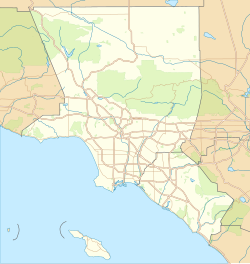The Cameo Theatre is a historic former movie theater on Broadway in Los Angeles, California. Opened by film mogul W. H. Clune as Clune's Broadway Theatre in 1910, it was one of the first purpose-built movie theaters in the United States. It remained the oldest continually operating movie theater in Los Angeles until its closure in 1991. Alfred Rosenheim designed the building in the Neoclassical style.
Cameo Theatre | |
 The former theater's facade in 2012 | |
Location of building in Los Angeles County | |
| Location | 528 S. Broadway, Los Angeles, California |
|---|---|
| Coordinates | 34°02′51″N 118°15′04″W / 34.0474°N 118.251°W |
| Built | 1910 |
| Architect | Alfred Rosenheim |
| Part of | Broadway Theater and Commercial District (ID79000484) |
| LAHCM No. | 524 |
| Significant dates | |
| Designated CP | May 9, 1979[2] |
| Designated LAHCM | March 20, 1991[1] |
History
editHollywood mogul W. H. Clune opened Clune's Broadway Theatre on October 10, 1910. Opening night rates were advertised at 10 cents for standard seats and 20 cents for loge seats.[3] The theater became one of the first in the United States built specifically to show movies.[4]
In 1921, a US$50,000 Wurlitzer organ was installed in the theater.[5] In 1924, Los Angeles theater proprietor H. L. Gumbinger closed the facility for renovation. The overhaul included the addition of a 16-piece house orchestra.[6] Gumbinger reopened the building as the Cameo Theatre on August 1, 1924, with a premiere of the Universal Pictures silent drama The Signal Tower attended by its director and co-stars.[7]
The Cameo was subsequently operated by various companies throughout its history: Fox West Coast Theatres, Pacific Theatres, and Metropolitan Theatres. The decline of the Cameo mirrored the downturn of the Broadway Theater District in Los Angeles.[4] At 4:00 a.m. on December 2, 1991, the Cameo was permanently closed following its final quadruple-bill run of action films.[8] At the time, it was the oldest operating movie theater in Los Angeles. The building retained most of its original facade and was converted into retail space.[4]
See also
editReferences
edit- ^ "Historical Cultural Monuments List" (PDF). City of Los Angeles. Retrieved October 24, 2024.
- ^ "National Register of Historic Places Inventory Nomination Form - California SP Broadway Theater and Commercial District". United States Department of the Interior - National Park Service. May 9, 1979.
- ^ "Clune's Broadway Theater Opens Monday". Los Angeles Times. October 9, 1910. Retrieved January 3, 2024 – via Newspapers.com.
- ^ a b c "Cameo Theatre". Los Angeles Conservancy. Retrieved January 3, 2024.
- ^ "Hello, Everyone! This is Bebe Daniels..." Los Angeles Evening Post-Record. April 16, 1921. Retrieved January 3, 2024 – via Newspapers.com.
- ^ "Reorganized Cameo Theater to Have 16-Piece Orchestra". Los Angeles Times. July 13, 1924. Retrieved January 3, 2024 – via Newspapers.com.
- ^ "Gala Opening for Cameo". Los Angeles Evening Post-Record. August 1, 1924. Retrieved January 3, 2024 – via Newspapers.com.
- ^ MacMinn, Aleene (December 3, 1991). "A Final Cameo Appearance". Los Angeles Times. Retrieved January 3, 2024 – via Newspapers.com.
